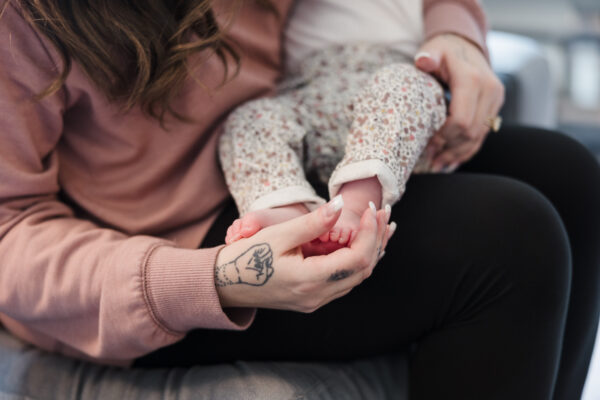Imagine if eating your morning bagel led you to test positive for opiates on a drug test. This isn’t just a joke from a 90s “Seinfeld” episode, it’s a growing threat to pregnant people across the country, exposing countless new parents to invasive child abuse investigations in the first weeks of their newborn’s life.
Last year, two new moms in New Jersey needed legal help after they were drug tested during labor – without their knowledge or consent – at local hospitals. There was no medical justification for the hospitals to perform these tests; they did so only because the patients were pregnant. for the hospitals to perform these tests; they did so only because the patients were pregnant.
Eating an everything bagel led to a positive test for opiates for both moms, setting up a nightmarish domino effect. Both hospitals reported the women to child protective services, opening months-long investigations into potential abuse of the babies. The traumatic experiences interfered with the first precious months they had with their newborns, shattered their trust in medical providers, and left them fearful of further unnecessary scrutiny from the state.
In March, the ACLU of New Jersey filed complaints on behalf of both mothers with the New Jersey Division on Civil Rights alleging the hospitals’ practice of drug testing pregnant patients is discrimination based on sex and pregnancy.
In New York, the story is eerily similar. Two women drug tested without their consent when giving birth received false positive results because they had eaten food containing poppy seeds. Both the women and their newborns later tested negative. The New York Division of Human Rights determined there is probable cause that the hospital unlawfully discriminated on the basis of gender and pregnancy when testing these women, and soon they will share their stories at a public hearing.
These women aren’t alone. Our organizations have heard from dozens of people who were unjustly drug tested and accused of being unfit parents. In addition to poppy seeds, many people have reported that prescribed medications caused positive drug results that prompted child welfare investigations – sometimes resulting in family separation – even though their own doctors had decided the medications were safe and necessary for their pregnant patients.
Of course, these incidents aren’t happening in a vacuum. Pregnant people are increasingly under suspicion, targeted for drug testing and criminalization in a post-Roe v. Wade world. States are moving faster than ever to enact extreme anti-abortion laws or other laws seeking to control pregnant people under the guise of “fetal personhood.”
Even in states like New Jersey and New York that have taken steps to protect abortion access and reproductive rights, pregnant people are still too often exposed to criminal consequences and state interventions simply because they are pregnant.
Contrary to the racist myths perpetuated by the failed drug war, drug testing pregnant people is not grounded in medical science. The American College of Obstetricians and Gynecologists has warned about the dangerous public health consequences of reporting pregnant people for substance use when they seek perinatal care, and rejects the practice of routinely drug testing pregnant people, particularly without informed consent. What's more, there is no medical reason to drug test pregnant patients in order to properly care for newborns. Data shows the best treatment for infants experiencing withdrawal is continuous physical connection with the birthing parent through skin-to-skin contact and breastfeeding. Rather than protect babies, drug testing deters pregnant and post-partum people from seeking essential medical care for themselves and their children, including substance use treatment when it’s needed.
Regardless of what triggers a positive result, patients should never be tested without consent, nor automatically reported to state authorities based on a positive test. These actions can separate families, causing intergenerational trauma, loss of housing, and unemployment. The stakes for pregnant people and parents are already far too high, particularly for Black women in New Jersey, who face unjustified higher levels of suspicion around drug use and experience the second highest Black maternal mortality rates in the country.
Hospitals must end discriminatory drug testing practices. Healthcare settings should be safe and welcoming places for pregnant people, not shrouded in unjustified accusations and suspicion.
Emma Roth is a staff attorney at Pregnancy Justice, the only organization in the U.S. dedicated to defending the rights and human dignity of pregnant people for all pregnancy outcomes.
Molly Linhorst is a staff attorney at the ACLU of New Jersey, which works to preserve, advance, and expand the individual rights and liberties guaranteed by the state and federal constitutions in courts, in the legislature, and in our communities.
This piece was originally published by the Star Ledger/nj.com.


